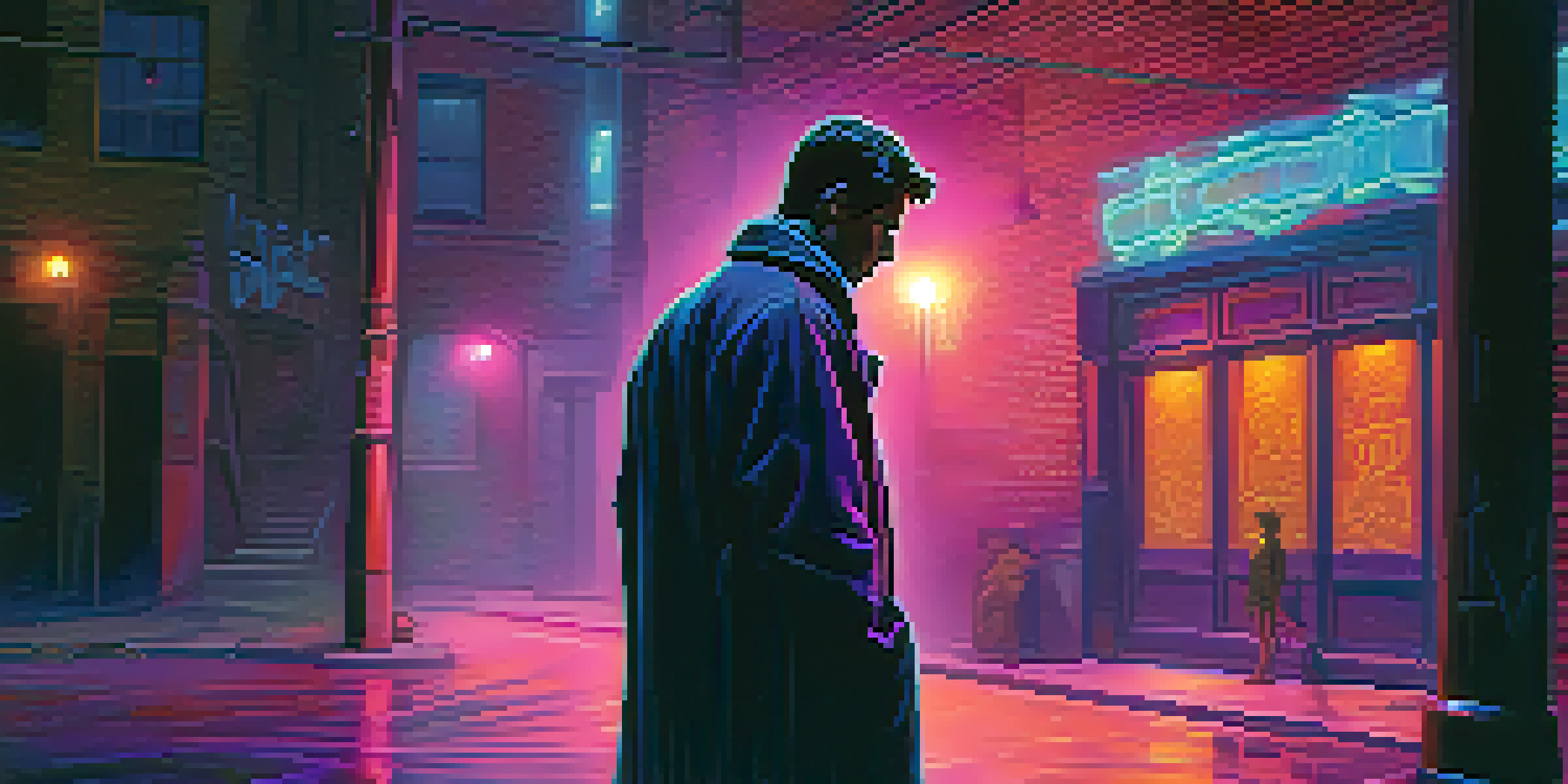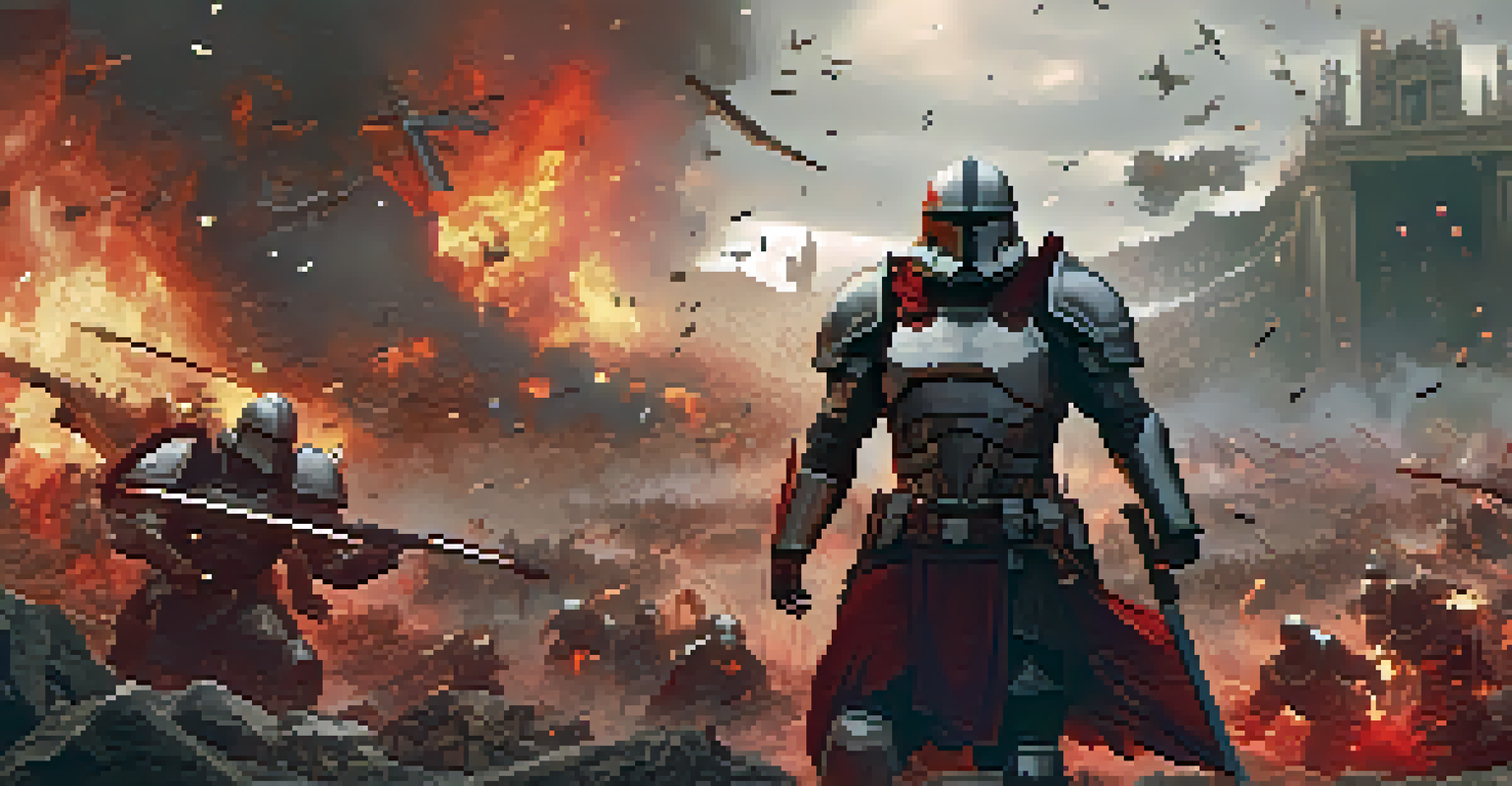Villains or Heroes? The Complexity of the Antihero Role

Defining the Antihero: More Than Meets the Eye
An antihero is a character who lacks traditional heroic qualities, such as morality and idealism. Instead of embodying the values we often associate with heroes, they may operate in shades of gray, making them complex and relatable. Think of characters like Walter White from 'Breaking Bad' or Deadpool, who often blur the lines between right and wrong.
The greatest heroes are often the most flawed.
This complexity is what draws audiences in; we see parts of ourselves in these flawed characters. They make mistakes, struggle with their choices, and often face consequences that feel all too real. In a world where perfection is unattainable, these characters remind us that it's okay to be imperfect.
As we delve deeper into their motivations and choices, we start to understand their humanity. The antihero becomes a mirror, reflecting our own internal conflicts and moral dilemmas, making their stories not just entertaining but also profoundly resonant.
The Appeal of Antiheroes in Popular Culture
Antiheroes have carved a significant niche in popular culture, from literature to film and television. Their appeal often lies in their unpredictability; we can't easily guess their next move, which keeps us on the edge of our seats. Shows like 'Breaking Bad' and 'The Sopranos' have thrived on this suspense, captivating millions of viewers.

Moreover, antiheroes often challenge societal norms, which can be incredibly liberating. They make us question what it means to be good or bad, prompting discussions about morality and ethics. Characters like Jack Sparrow from 'Pirates of the Caribbean' embody this charm, leading us to root for them despite their questionable choices.
Antiheroes Reflect Our Imperfections
Antiheroes are relatable characters who reveal our own flaws and moral dilemmas, reminding us it's okay to be imperfect.
Their complexity allows for rich narratives that explore deeper themes, such as redemption, revenge, and the human condition. This depth transforms a simple story into a compelling exploration of life’s gray areas.
The Psychological Depth of Antiheroes
One of the most fascinating aspects of antiheroes is their psychological complexity. They often grapple with inner demons, making their journey not just external but deeply internal as well. This conflict can stem from past trauma, societal pressures, or a desire for power, providing a layered understanding of their actions.
The line between good and evil is often blurred; the true challenge lies in understanding the complexities of human nature.
Take, for instance, the character of Tony Soprano. His struggles with anxiety and the weight of his criminal empire create a multifaceted persona that is both terrifying and tragically relatable. We watch him navigate his relationships, family, and business with a mix of charm and brutality, highlighting the duality of his character.
This psychological depth allows audiences to empathize with antiheroes, even when they commit unspeakable acts. It challenges us to look beyond surface-level judgments and explore the factors that drive individuals to make morally ambiguous choices.
The Evolution of the Antihero in Stories
The antihero has evolved significantly from early literature to modern storytelling. In classic literature, characters like Hamlet showcased traits of the antihero through their existential dilemmas and moral ambiguity. However, modern antiheroes often possess a more relatable and flawed nature, making them feel closer to our everyday experiences.
As storytelling has progressed, audiences have become more accepting of characters who defy traditional morality. This shift reflects broader societal changes, as we increasingly recognize the complexities of human nature. Characters like Katniss Everdeen in 'The Hunger Games' embody this evolution, as she fights against an oppressive system while grappling with her own ethical decisions.
Moral Ambiguity Engages Audiences
The complexity of antiheroes, operating in moral gray areas, invites audiences to engage in ethical debates about right and wrong.
This evolution invites writers to explore richer narratives that challenge the concept of heroism itself. It opens up a dialogue about what it truly means to be a hero in a complicated world.
Antiheroes and the Moral Gray Area
One of the most compelling elements of antiheroes is their embodiment of the moral gray area. Unlike traditional heroes, who often have clear motives and virtuous paths, antiheroes operate in a world filled with moral ambiguity. This complexity invites audiences to engage in ethical debates about right and wrong.
Consider characters like Dexter Morgan from 'Dexter,' who channels his violent urges into targeting other criminals. While his actions are undeniably illegal, viewers often find themselves rooting for him because of his twisted sense of justice. This moral complexity raises questions about the nature of justice and the lengths one might go to achieve it.
By showcasing characters who live in this gray space, antihero narratives encourage us to reflect on our own moral beliefs. They challenge us to confront the uncomfortable realities of life, reminding us that not everything is black and white.
The Role of Antiheroes in Social Commentary
Antiheroes often serve as powerful vehicles for social commentary. By challenging societal norms and conventions, they highlight the flaws and contradictions within our systems. This makes their stories not just entertaining, but also thought-provoking, as they often expose underlying issues in society.
For example, the character of V in 'V for Vendetta' embodies the struggle against totalitarianism and the quest for freedom. His methods are extreme, but they spark discussions about the nature of rebellion and the limits of government control. In this way, antiheroes become symbols of resistance, prompting viewers to reevaluate their own beliefs and values.
Antiheroes as Social Commentary
Through their actions, antiheroes challenge societal norms and provoke critical thought, often becoming symbols of resistance.
Through their actions and narratives, antiheroes can inspire change and provoke critical thought. They become catalysts for conversations about morality, justice, and the human experience, often resonating with audiences on a deeper level.
Conclusion: The Enduring Legacy of the Antihero
As we reflect on the complexity of antiheroes, it's clear that their legacy will endure in storytelling. Their ability to challenge our perceptions of heroism and morality keeps them relevant and engaging across genres. Each antihero offers a unique perspective, revealing the intricacies of human nature.
Whether we love them or despise them, these characters force us to confront uncomfortable truths about ourselves and society. They remind us that every story has multiple sides, and that understanding these nuances is essential to grasping the human experience.

Ultimately, the antihero serves as a reminder that we all have flaws, and it's these imperfections that make us relatable. As long as stories are told, the antihero will continue to captivate audiences, inviting us to explore the depths of morality and humanity.